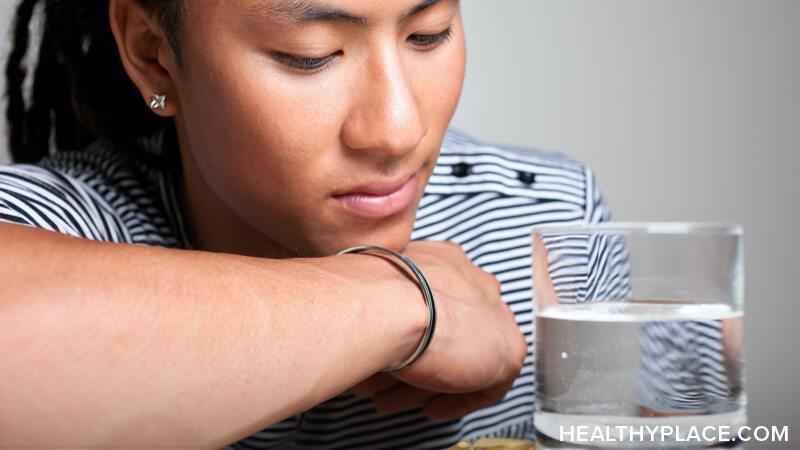Three Ways Dehydration Can Impact Your Mental Health
 There are three ways dehydration can impact your mental health. It's summer in the Northern Hemisphere, and for a lot of us that means heat and humidity. We already know that psychiatric patients are effected by the heat, but there are also three ways dehydration can impact your mental health?
There are three ways dehydration can impact your mental health. It's summer in the Northern Hemisphere, and for a lot of us that means heat and humidity. We already know that psychiatric patients are effected by the heat, but there are also three ways dehydration can impact your mental health?
Dehydration and Your Mental Health
Here are three ways dehydration will affect your mental health and why it works that way.
Dehydration Causes Fatigue
The first way dehydration can impact your mental health is by causing fatigue. Simply put, if it's a hot day and you're tired, dehydration may be the culprit. This has happened to me, and a quick bottle of water fixed the problem. However, sometimes water isn't the best way to rehydrate. One study quoted in Fitness Magazine found that chocolate milk was the best way to rehydrate between intense exercise sessions. And if you're lacking electrolytes, water won't have any effect--you'll need a sports drink or water with a little bit of salt.
Heat cramps are the first warning sign of heat-related fatigue. Other warning signs include heavy sweating, exhaustion, and extreme thirst. If you have these signs, get into a cool area and drink fluids to prevent it from becoming heat exhaustion.
If it becomes heat exhaustion, you can typically treat it at home. Rest. Drink cool liquids. Loosen your clothes. Try to get inside or at least in the shade. But sometimes you can't sweat enough to cool off. Then your symptoms can progress to where you need medical help, especially when it gets to hallucinations and confusion.
Dehydration and Mental Health: Hallucinations and Confusion
Typically, if you've hit this point, you need medical treatment quickly. I've hit this point twice, both times because my psychiatric medication interfered with my ability to sweat. I'll never forget the first time--I was in Texas, my estranged brother was in Indiana and I became convinced my sailing professor was keeping me from talking to my brother in person.
The second time scared me--I was in downtown Indianapolis and I thought the buildings were curving downward to touch the ground. Both times I realized I needed medical treatment and got it quickly, but not before I'd been shaken up pretty good.
If you're out in the heat and confusion sets in, take action immediately. First, get out of the heat as soon as possible--into air-conditioning is best, but shade will suffice if that's not an option. Drink a sports drink to rehydrate. Loosen your clothes and if possible, put some cool cloths on your exposed skin. If you can get inside, take a cool bath or shower.
If it's progressed to hallucinations, get to a hospital. Be sure to tell them what medications you're on, especially if they can interfere with your ability to sweat. More often than not, they'll give you a saline IV and that'll help put a stop to your heat-related hallucinations and confusion.
Dehydration and Mental Health: Suicidal Ideation
The suicide rate increases when it gets hot. So do admissions to psychiatric hospitals. As I quoted Dr. Len Cortese in a previous article:
Essentially, what’s occurring is that the neurotransmitters, the chemicals in the brain, are probably going off balance. When chemicals in the brain go off balance, it will cause difficulties in what the brain does. And what the brain does is, it helps us with our mood, so our mood is set off. The brain helps us keep our anxiety under control so [during heat] people have difficulties with anxiety.
Cortese told the Canadian Broadcasting Corporation:
During heatwaves there's an increase in suicide, and there's an increase in aggressive behaviour . . . Again, it's the stress of the heat that's affecting the brain.
So stay hydrated, limit activity during the heat, and when you can't avoid the heat, rely on positive coping skills. Don't become, as we said in the Army, a "heat casualty."
APA Reference
Oberg, B.
(2017, July 24). Three Ways Dehydration Can Impact Your Mental Health, HealthyPlace. Retrieved
on 2026, February 28 from https://www.healthyplace.com/blogs/recoveringfrommentalillness/2017/07/three-ways-dehydration-can-impact-your-mental-health
Author: Becky Oberg
Thank you so much! I have had a couple of relapses due to dehydration. The funny part is that the medicos in the Armed Forces where I was then didn't understand it this way. Though I out of my knowledge of survival could understand the symptoms of dehydration. Dryness in the mouth, urge to have glucose and salt etc.
I have been very sick as l just found out l was very dehydrate and took long time to get better l had gained as l didn't have fluid in my body so it couldn't burn fat and got infections as l was so dehydrated which could properly l recommended everyone drink 6 to8 glasses a day don't drink soda drinks like coke as they cause a lot of health problems keep your health well fluid as nothing works properly without drink water read this as it very important to know
This
It may also be that dehydration was causing you to exhibit the symptoms of bipolar disorder or that the medication you may have have taken to treat bipolar disorder was causing dehydration and exacerbating your bipolar symptoms. Both are common. Many medications can cause dehydration and misdiagnosed mental health conditions. Proper hydration is key to maintaining physical and mental health.
Great information. I don't think this is something people would necessarily think about but it can be such a small fix to preventing much larger problems from occurring. Thanks for the reminder!